Yi Jing Hexagram 25 - Line 3
The hexagram: 25
An hexagram is a combination of six yin and yang lines.
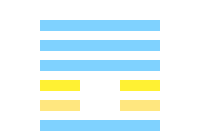
25.3 (25 > 13) - THE WÛ WANG HEXAGRAM.
The third line, divided, shows calamity happening to one who is free from insincerity ; as in the case of an ox that has been tied up. A passer by finds it (and carries it off), while the people in the neighbourhood have the calamity (of being accused and apprehended).
Bing DeepL Google Yandex25.3 (25 > 13) - Detaching oneself
Another has taken what one liked because one forgot it.
Bing DeepL Google Yandex25.3 (25 > 13) - Detaching oneself
Another has taken what one liked because one forgot it.
Bing DeepL Google Yandex25.3 (25 > 13) - Wu wâng, l’innocence, l’imprévu
Wu wāng : sans blâme, irréprochable, honnête.
Celui dont la conduite est parfaite peut cependant avoir quelque malheur immérité ; c’est comme un boeuf (innocent) attaché ; son conducteur le traîne ; les gens de l’endroit le maltraitent.
Bing DeepL Google Yandex25.3 (25 > 13) - Se détacher
Un autre a pris ce qu'on appréciait car on l'a oublié.
Bing DeepL Google Yandex25.3 (25 > 13) - Vakmerőség
Egy másik elvette amiben örömét lelte mert elfeledkezett róla.
Bing DeepL Google YandexThe trigrams
The trigrams are combinations of three yin and yang lines. The three bottom lines of the hexagram form the lower trigram and represent the inner situation. The three top lines form the upper trigram and represent the outer situation.
trigSup

Lower trigram: The thunder The fire


The nuclear hexagram: 53.2.4 (53 > 44)
The nuclear hexagram is the association of the two inner trigrams (lines 2,3,4 and 3,4,5). It represents the root, or the origin of the situation.
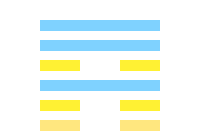
53.2.4 (53 > 44) - THE KIEN HEXAGRAM.
- 2. The second line, divided, shows the geese gradually approaching the large rocks, where they eat and drink joyfully and at ease. There will be good fortune.
- 4. The fourth line, divided, shows the geese gradually advanced to the trees. They may light on the flat branches. There will be no error.
53.2.4 (53 > 44) - Tsien, le progrès par étapes
Tsién : avancement, progrès, graduellement, aller pas à pas ; se marier, retourner chez ses parents pour les visiter (dit d’une femme).
- 2. Ces oies vont pas à pas vers des rochers où elles auront à manger et à boire ; joyeuses et contentes (de leur prudence persévérante), elles y sont tout à l’aise [et n’y ont pas une satisfaction vaine.].
- 4. Les oies avancent pas à pas vers un arbre. Qui gagnera les grosses branches y sera bien, pourra s’y reposer.
53.2.4 (53 > 44) - Társulás
- 2. Konzultál a legjártasabbal a problémákról amikkel szembesülhet.
- 4. Odébbáll hogy találjon egy szabad helyet.
The derived (Fan Yao)
The same line number on the mutated hexagram. It reperesents what can be done AFTER to correct the situation described by this line, as a sort of remedy or solution.
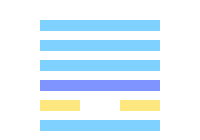
13.3 (13 > 25) - THE THUNG ZĂN HEXAGRAM.
The third line, undivided, (shows its subject) with his arms hidden in the thick grass, and at the top of a high mound. (But) for three years he makes no demonstration.
Bing DeepL Google Yandex13.3 (13 > 25) - T’ong, la compagnie fraternelle des hommes
T’ong : union, harmonie.
(Moyen de garder l’union.) Cacher ses armes tout en restant vigilant (sur son élévation) et ne point les relever de longtemps (litt. : trois ans).
Agir toujours pacifiquement.
The juncture: 14.4
The derived of the reciprocal. It represents what could have been done BEFORE to prevent the situation described by this line, as a sort of remedy or solution.
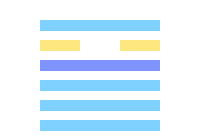
14.4 (14 > 26) - THE TÂ YÛ HEXAGRAM.
The fourth line, undivided, shows its subject keeping his great resources under restraint. There will be no error.
Bing DeepL Google Yandex14.4 (14 > 26) - Not diverting oneself
One doesn't defy others by choosing another way.
Bing DeepL Google Yandex14.4 (14 > 26) - Not diverting oneself
One doesn't defy others by choosing another way.
Bing DeepL Google Yandex14.4 (14 > 26) - Ta, le grand avoir
Tá : grand, grandeur, grandir, développement.
L’homme grand ne commet pas de faute concernant ce qui ne lui appartient pas (n’est pas son droit).
Il le distingue clairement.
14.4 (14 > 26) - Ne pas se détourner
On ne défie pas les autres en choisissant une autre voie.
Bing DeepL Google Yandex14.4 (14 > 26) - Az igények kielégítése
Nem fordul el hogy szembeszálljon másokkal.
Bing DeepL Google YandexThe reciprocal: 26.4
The hexagram upside down. It represents the opposite situation, and as such is insturmental when validating comments.
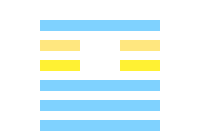
26.4 (26 > 14) - THE TÂ KHÛ HEXAGRAM.
The fourth line, divided, shows the young bull, (and yet) having the piece of wood over his horns. There will be great good fortune.
Bing DeepL Google Yandex26.4 (26 > 14) - Surrendering to the resistance
One controls the other's aggressiveness by yielding.
Bing DeepL Google Yandex26.4 (26 > 14) - Surrendering to the resistance
One controls the other's aggressiveness by yielding.
Bing DeepL Google Yandex26.4 (26 > 14) - Tá tchu, le pouvoir contraignant de la grandeur
Tá tchu : 1. Grand entretien ; 2. Dompter, conduire
Le joug, la planchette que porte le jeune boeuf est d’un usage très heureux pour le dompter et le former au labourage (second sens).
Bing DeepL Google Yandex26.4 (26 > 14) - Se rendre à la résistance
On maîtrise l'agressivité de l'autre en cédant.
Bing DeepL Google YandexMutations

25.3 (25 > 13) - THE WÛ WANG HEXAGRAM.
The third line, divided, shows calamity happening to one who is free from insincerity ; as in the case of an ox that has been tied up. A passer by finds it (and carries it off), while the people in the neighbourhood have the calamity (of being accused and apprehended).
Bing DeepL Google Yandex25.3 (25 > 13) - Detaching oneself
Another has taken what one liked because one forgot it.
Bing DeepL Google Yandex25.3 (25 > 13) - Detaching oneself
Another has taken what one liked because one forgot it.
Bing DeepL Google Yandex25.3 (25 > 13) - Wu wâng, l’innocence, l’imprévu
Wu wāng : sans blâme, irréprochable, honnête.
Celui dont la conduite est parfaite peut cependant avoir quelque malheur immérité ; c’est comme un boeuf (innocent) attaché ; son conducteur le traîne ; les gens de l’endroit le maltraitent.
Bing DeepL Google Yandex25.3 (25 > 13) - Se détacher
Un autre a pris ce qu'on appréciait car on l'a oublié.
Bing DeepL Google Yandex25.3 (25 > 13) - Vakmerőség
Egy másik elvette amiben örömét lelte mert elfeledkezett róla.
Bing DeepL Google Yandex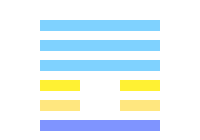
25.1.3 (25 > 33) - THE WÛ WANG HEXAGRAM.
- 1. The first line, undivided, shows its subject free from all insincerity. His advance will be accompanied with good fortune.
- 3. The third line, divided, shows calamity happening to one who is free from insincerity ; as in the case of an ox that has been tied up. A passer by finds it (and carries it off), while the people in the neighbourhood have the calamity (of being accused and apprehended).
25.1.3 (25 > 33) - Getting confused in one' s explanations
One complicates things in the hope of making them easier to understand.
Bing DeepL Google Yandex25.1.3 (25 > 33) - Getting confused in one' s explanations
One complicates things in the hope of making them easier to understand.
Bing DeepL Google Yandex25.1.3 (25 > 33) - Wu wâng, l’innocence, l’imprévu
Wu wāng : sans blâme, irréprochable, honnête.
- 1. Quand la conduite est irréprochable, toute démarche est heureuse.
- 3. Celui dont la conduite est parfaite peut cependant avoir quelque malheur immérité ; c’est comme un boeuf (innocent) attaché ; son conducteur le traîne ; les gens de l’endroit le maltraitent.
25.1.3 (25 > 33) - S'embrouiller dans ses explications
On complique les choses en espérant les rendre plus faciles à comprendre.
Bing DeepL Google Yandex25.1.3 (25 > 33) - Vakmerőség
- 1. Bizonyítékot akar látni mielőtt egyetértene.
- 3. Egy másik elvette amiben örömét lelte mert elfeledkezett róla.
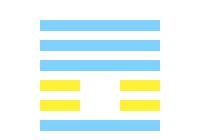
25.2.3 (25 > 1) - THE WÛ WANG HEXAGRAM.
- 2. The second line, divided, shows one who reaps without having ploughed (that he might reap), and gathers the produce of his third year's fields without having cultivated them the first year for that end. To such a one there will be advantage in whatever direction he may move.
- 3. The third line, divided, shows calamity happening to one who is free from insincerity ; as in the case of an ox that has been tied up. A passer by finds it (and carries it off), while the people in the neighbourhood have the calamity (of being accused and apprehended).
25.2.3 (25 > 1) - Waiting until the work is finished
One explains to others that it is too soon to resume because the improvements are not done.
Bing DeepL Google Yandex25.2.3 (25 > 1) - Waiting until the work is finished
One explains to others that it is too soon to resume because the improvements are not done.
Bing DeepL Google Yandex25.2.3 (25 > 1) - Wu wâng, l’innocence, l’imprévu
Wu wāng : sans blâme, irréprochable, honnête.
- 2. On récolte sans labourer, on moissonne sans avoir semé ; tout réussit en tout ce qu’on fait (quand on est intègre).
- 3. Celui dont la conduite est parfaite peut cependant avoir quelque malheur immérité ; c’est comme un boeuf (innocent) attaché ; son conducteur le traîne ; les gens de l’endroit le maltraitent.
25.2.3 (25 > 1) - Attendre que les travaux soient finis
On explique aux autres qu’il est trop tôt pour reprendre car les améliorations ne sont pas terminées.
Bing DeepL Google Yandex25.2.3 (25 > 1) - Vakmerőség
- 2. Mielőtt a nyereségre gondolnánk, javítani kell a munkánk minőségén.
- 3. Egy másik elvette amiben örömét lelte mert elfeledkezett róla.
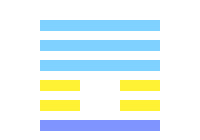
25.1.2.3 (25 > 44) - THE WÛ WANG HEXAGRAM.
- 1. The first line, undivided, shows its subject free from all insincerity. His advance will be accompanied with good fortune.
- 2. The second line, divided, shows one who reaps without having ploughed (that he might reap), and gathers the produce of his third year's fields without having cultivated them the first year for that end. To such a one there will be advantage in whatever direction he may move.
- 3. The third line, divided, shows calamity happening to one who is free from insincerity ; as in the case of an ox that has been tied up. A passer by finds it (and carries it off), while the people in the neighbourhood have the calamity (of being accused and apprehended).
25.1.2.3 (25 > 44) - Recounting
One redoes one's calculations to prevent an error from interfering with the results.
Bing DeepL Google Yandex25.1.2.3 (25 > 44) - Recounting
One redoes one's calculations to prevent an error from interfering with the results.
Bing DeepL Google Yandex25.1.2.3 (25 > 44) - Wu wâng, l’innocence, l’imprévu
Wu wāng : sans blâme, irréprochable, honnête.
- 1. Quand la conduite est irréprochable, toute démarche est heureuse.
- 2. On récolte sans labourer, on moissonne sans avoir semé ; tout réussit en tout ce qu’on fait (quand on est intègre).
- 3. Celui dont la conduite est parfaite peut cependant avoir quelque malheur immérité ; c’est comme un boeuf (innocent) attaché ; son conducteur le traîne ; les gens de l’endroit le maltraitent.
25.1.2.3 (25 > 44) - Recompter
On refait ses calculs pour éviter qu'une erreur ne s'immisce dans les résultats.
Bing DeepL Google Yandex25.1.2.3 (25 > 44) - Vakmerőség
- 1. Bizonyítékot akar látni mielőtt egyetértene.
- 2. Mielőtt a nyereségre gondolnánk, javítani kell a munkánk minőségén.
- 3. Egy másik elvette amiben örömét lelte mert elfeledkezett róla.
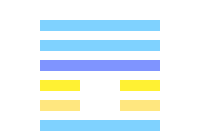
25.3.4 (25 > 37) - THE WÛ WANG HEXAGRAM.
- 3. The third line, divided, shows calamity happening to one who is free from insincerity ; as in the case of an ox that has been tied up. A passer by finds it (and carries it off), while the people in the neighbourhood have the calamity (of being accused and apprehended).
- 4. The fourth line, undivided, shows (a case) in which, if its subject can remain firm and correct, there will be no error.
25.3.4 (25 > 37) - Studying the competition
One compares one's processes with those of one's competitors.
Bing DeepL Google Yandex25.3.4 (25 > 37) - Studying the competition
One compares one's processes with those of one's competitors.
Bing DeepL Google Yandex25.3.4 (25 > 37) - Wu wâng, l’innocence, l’imprévu
Wu wāng : sans blâme, irréprochable, honnête.
- 3. Celui dont la conduite est parfaite peut cependant avoir quelque malheur immérité ; c’est comme un boeuf (innocent) attaché ; son conducteur le traîne ; les gens de l’endroit le maltraitent.
-
4. La bonne conduite (seule) peut prospérer sans revers.
Elle aura une prospérité sûre.
25.3.4 (25 > 37) - Étudier la compétition
On compare ses procédés avec ceux de ses concurrents.
Bing DeepL Google Yandex25.3.4 (25 > 37) - Vakmerőség
- 3. Egy másik elvette amiben örömét lelte mert elfeledkezett róla.
- 4. Követeli ami elveszett.
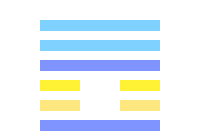
25.1.3.4 (25 > 53) - THE WÛ WANG HEXAGRAM.
- 1. The first line, undivided, shows its subject free from all insincerity. His advance will be accompanied with good fortune.
- 3. The third line, divided, shows calamity happening to one who is free from insincerity ; as in the case of an ox that has been tied up. A passer by finds it (and carries it off), while the people in the neighbourhood have the calamity (of being accused and apprehended).
- 4. The fourth line, undivided, shows (a case) in which, if its subject can remain firm and correct, there will be no error.
25.1.3.4 (25 > 53) - Drawing one's weapon
One retains full discretion to indulge in one's evil excesses.
Bing DeepL Google Yandex25.1.3.4 (25 > 53) - Drawing one's weapon
One retains full discretion to indulge in one's evil excesses.
Bing DeepL Google Yandex25.1.3.4 (25 > 53) - Wu wâng, l’innocence, l’imprévu
Wu wāng : sans blâme, irréprochable, honnête.
- 1. Quand la conduite est irréprochable, toute démarche est heureuse.
- 3. Celui dont la conduite est parfaite peut cependant avoir quelque malheur immérité ; c’est comme un boeuf (innocent) attaché ; son conducteur le traîne ; les gens de l’endroit le maltraitent.
-
4. La bonne conduite (seule) peut prospérer sans revers.
Elle aura une prospérité sûre.
25.1.3.4 (25 > 53) - Dégainer son arme
On a toute latitude pour s'adonner à ses excès malfaisants.
Bing DeepL Google Yandex25.1.3.4 (25 > 53) - Vakmerőség
- 1. Bizonyítékot akar látni mielőtt egyetértene.
- 3. Egy másik elvette amiben örömét lelte mert elfeledkezett róla.
- 4. Követeli ami elveszett.
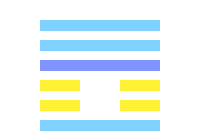
25.2.3.4 (25 > 9) - THE WÛ WANG HEXAGRAM.
- 2. The second line, divided, shows one who reaps without having ploughed (that he might reap), and gathers the produce of his third year's fields without having cultivated them the first year for that end. To such a one there will be advantage in whatever direction he may move.
- 3. The third line, divided, shows calamity happening to one who is free from insincerity ; as in the case of an ox that has been tied up. A passer by finds it (and carries it off), while the people in the neighbourhood have the calamity (of being accused and apprehended).
- 4. The fourth line, undivided, shows (a case) in which, if its subject can remain firm and correct, there will be no error.
25.2.3.4 (25 > 9) - Wu wâng, l’innocence, l’imprévu
Wu wāng : sans blâme, irréprochable, honnête.
- 2. On récolte sans labourer, on moissonne sans avoir semé ; tout réussit en tout ce qu’on fait (quand on est intègre).
- 3. Celui dont la conduite est parfaite peut cependant avoir quelque malheur immérité ; c’est comme un boeuf (innocent) attaché ; son conducteur le traîne ; les gens de l’endroit le maltraitent.
-
4. La bonne conduite (seule) peut prospérer sans revers.
Elle aura une prospérité sûre.
25.2.3.4 (25 > 9) - Prendre des vessies pour des lanternes
On prend au sérieux des idées sans fondements.
Bing DeepL Google Yandex25.2.3.4 (25 > 9) - Vakmerőség
- 2. Mielőtt a nyereségre gondolnánk, javítani kell a munkánk minőségén.
- 3. Egy másik elvette amiben örömét lelte mert elfeledkezett róla.
- 4. Követeli ami elveszett.
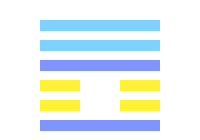
25.1.2.3.4 (25 > 57) - THE WÛ WANG HEXAGRAM.
- 1. The first line, undivided, shows its subject free from all insincerity. His advance will be accompanied with good fortune.
- 2. The second line, divided, shows one who reaps without having ploughed (that he might reap), and gathers the produce of his third year's fields without having cultivated them the first year for that end. To such a one there will be advantage in whatever direction he may move.
- 3. The third line, divided, shows calamity happening to one who is free from insincerity ; as in the case of an ox that has been tied up. A passer by finds it (and carries it off), while the people in the neighbourhood have the calamity (of being accused and apprehended).
- 4. The fourth line, undivided, shows (a case) in which, if its subject can remain firm and correct, there will be no error.
25.1.2.3.4 (25 > 57) - Triggering an exodus
One depopulates a village by promising them a better future.
Bing DeepL Google Yandex25.1.2.3.4 (25 > 57) - Triggering an exodus
One depopulates a village by promising them a better future.
Bing DeepL Google Yandex25.1.2.3.4 (25 > 57) - Wu wâng, l’innocence, l’imprévu
Wu wāng : sans blâme, irréprochable, honnête.
- 1. Quand la conduite est irréprochable, toute démarche est heureuse.
- 2. On récolte sans labourer, on moissonne sans avoir semé ; tout réussit en tout ce qu’on fait (quand on est intègre).
- 3. Celui dont la conduite est parfaite peut cependant avoir quelque malheur immérité ; c’est comme un boeuf (innocent) attaché ; son conducteur le traîne ; les gens de l’endroit le maltraitent.
-
4. La bonne conduite (seule) peut prospérer sans revers.
Elle aura une prospérité sûre.
25.1.2.3.4 (25 > 57) - Déclencher un exode
On dépeuple un village en leur promettant un avenir meilleur.
Bing DeepL Google Yandex25.1.2.3.4 (25 > 57) - Vakmerőség
- 1. Bizonyítékot akar látni mielőtt egyetértene.
- 2. Mielőtt a nyereségre gondolnánk, javítani kell a munkánk minőségén.
- 3. Egy másik elvette amiben örömét lelte mert elfeledkezett róla.
- 4. Követeli ami elveszett.
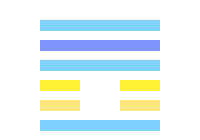
25.3.5 (25 > 30) - THE WÛ WANG HEXAGRAM.
- 3. The third line, divided, shows calamity happening to one who is free from insincerity ; as in the case of an ox that has been tied up. A passer by finds it (and carries it off), while the people in the neighbourhood have the calamity (of being accused and apprehended).
- 5. The fifth line, undivided, shows one who is free from insincerity, and yet has fallen ill. Let him not use medicine, and he will have occasion for joy (in his recovery).
25.3.5 (25 > 30) - Recognising a fault
One knows why the others have not said what they knew.
Bing DeepL Google Yandex25.3.5 (25 > 30) - Recognizing a fault
One knows why the others have not said what they knew.
Bing DeepL Google Yandex25.3.5 (25 > 30) - Wu wâng, l’innocence, l’imprévu
Wu wāng : sans blâme, irréprochable, honnête.
- 3. Celui dont la conduite est parfaite peut cependant avoir quelque malheur immérité ; c’est comme un boeuf (innocent) attaché ; son conducteur le traîne ; les gens de l’endroit le maltraitent.
-
5. L’honnête homme malade n’a pas besoin de médecine pour être content. (Il l’est par le témoignage de sa conscience.)
Il ne doit pas en essayer.
25.3.5 (25 > 30) - Reconnaître une faute
On sait pourquoi les autres n'ont pas dit ce qu'ils savaient.
Bing DeepL Google Yandex25.3.5 (25 > 30) - Vakmerőség
- 3. Egy másik elvette amiben örömét lelte mert elfeledkezett róla.
- 5. Önként vállalt korlátok révén csökkent.
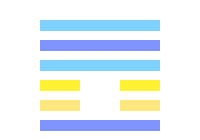
25.1.3.5 (25 > 56) - THE WÛ WANG HEXAGRAM.
- 1. The first line, undivided, shows its subject free from all insincerity. His advance will be accompanied with good fortune.
- 3. The third line, divided, shows calamity happening to one who is free from insincerity ; as in the case of an ox that has been tied up. A passer by finds it (and carries it off), while the people in the neighbourhood have the calamity (of being accused and apprehended).
- 5. The fifth line, undivided, shows one who is free from insincerity, and yet has fallen ill. Let him not use medicine, and he will have occasion for joy (in his recovery).
25.1.3.5 (25 > 56) - Escaping the issue
One avoids talking about embarrassing topics.
Bing DeepL Google Yandex25.1.3.5 (25 > 56) - Escaping the issue
One avoids talking about embarrassing topics.
Bing DeepL Google Yandex25.1.3.5 (25 > 56) - Wu wâng, l’innocence, l’imprévu
Wu wāng : sans blâme, irréprochable, honnête.
- 1. Quand la conduite est irréprochable, toute démarche est heureuse.
- 3. Celui dont la conduite est parfaite peut cependant avoir quelque malheur immérité ; c’est comme un boeuf (innocent) attaché ; son conducteur le traîne ; les gens de l’endroit le maltraitent.
-
5. L’honnête homme malade n’a pas besoin de médecine pour être content. (Il l’est par le témoignage de sa conscience.)
Il ne doit pas en essayer.
25.1.3.5 (25 > 56) - Éluder la question
On évite de parler de sujets embarrassants.
Bing DeepL Google Yandex25.1.3.5 (25 > 56) - Vakmerőség
- 1. Bizonyítékot akar látni mielőtt egyetértene.
- 3. Egy másik elvette amiben örömét lelte mert elfeledkezett róla.
- 5. Önként vállalt korlátok révén csökkent.
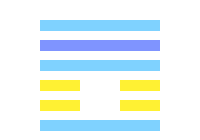
25.2.3.5 (25 > 14) - THE WÛ WANG HEXAGRAM.
- 2. The second line, divided, shows one who reaps without having ploughed (that he might reap), and gathers the produce of his third year's fields without having cultivated them the first year for that end. To such a one there will be advantage in whatever direction he may move.
- 3. The third line, divided, shows calamity happening to one who is free from insincerity ; as in the case of an ox that has been tied up. A passer by finds it (and carries it off), while the people in the neighbourhood have the calamity (of being accused and apprehended).
- 5. The fifth line, undivided, shows one who is free from insincerity, and yet has fallen ill. Let him not use medicine, and he will have occasion for joy (in his recovery).
25.2.3.5 (25 > 14) - Controlling spending
One crosses swords with those who would rather be inclined to give without keeping score.
Bing DeepL Google Yandex25.2.3.5 (25 > 14) - Controlling spending
One crosses swords with those who would rather be inclined to give without keeping score.
Bing DeepL Google Yandex25.2.3.5 (25 > 14) - Wu wâng, l’innocence, l’imprévu
Wu wāng : sans blâme, irréprochable, honnête.
- 2. On récolte sans labourer, on moissonne sans avoir semé ; tout réussit en tout ce qu’on fait (quand on est intègre).
- 3. Celui dont la conduite est parfaite peut cependant avoir quelque malheur immérité ; c’est comme un boeuf (innocent) attaché ; son conducteur le traîne ; les gens de l’endroit le maltraitent.
-
5. L’honnête homme malade n’a pas besoin de médecine pour être content. (Il l’est par le témoignage de sa conscience.)
Il ne doit pas en essayer.
25.2.3.5 (25 > 14) - Maîtriser les dépenses
On croise le fer avec ceux qui seraient plutôt enclins à donner sans compter.
Bing DeepL Google Yandex25.2.3.5 (25 > 14) - Vakmerőség
- 2. Mielőtt a nyereségre gondolnánk, javítani kell a munkánk minőségén.
- 3. Egy másik elvette amiben örömét lelte mert elfeledkezett róla.
- 5. Önként vállalt korlátok révén csökkent.
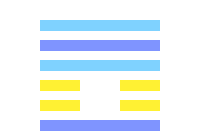
25.1.2.3.5 (25 > 50) - THE WÛ WANG HEXAGRAM.
- 1. The first line, undivided, shows its subject free from all insincerity. His advance will be accompanied with good fortune.
- 2. The second line, divided, shows one who reaps without having ploughed (that he might reap), and gathers the produce of his third year's fields without having cultivated them the first year for that end. To such a one there will be advantage in whatever direction he may move.
- 3. The third line, divided, shows calamity happening to one who is free from insincerity ; as in the case of an ox that has been tied up. A passer by finds it (and carries it off), while the people in the neighbourhood have the calamity (of being accused and apprehended).
- 5. The fifth line, undivided, shows one who is free from insincerity, and yet has fallen ill. Let him not use medicine, and he will have occasion for joy (in his recovery).
25.1.2.3.5 (25 > 50) - Belly flop
One will succeed in making a lot of buzz with a huge mistake.
Bing DeepL Google Yandex25.1.2.3.5 (25 > 50) - Belly flop
One will succeed in making a lot of buzz with a huge mistake.
Bing DeepL Google Yandex25.1.2.3.5 (25 > 50) - Wu wâng, l’innocence, l’imprévu
Wu wāng : sans blâme, irréprochable, honnête.
- 1. Quand la conduite est irréprochable, toute démarche est heureuse.
- 2. On récolte sans labourer, on moissonne sans avoir semé ; tout réussit en tout ce qu’on fait (quand on est intègre).
- 3. Celui dont la conduite est parfaite peut cependant avoir quelque malheur immérité ; c’est comme un boeuf (innocent) attaché ; son conducteur le traîne ; les gens de l’endroit le maltraitent.
-
5. L’honnête homme malade n’a pas besoin de médecine pour être content. (Il l’est par le témoignage de sa conscience.)
Il ne doit pas en essayer.
25.1.2.3.5 (25 > 50) - Faire un plat
On réussira à faire beaucoup de buzz avec une erreur magistrale.
Bing DeepL Google Yandex25.1.2.3.5 (25 > 50) - Vakmerőség
- 1. Bizonyítékot akar látni mielőtt egyetértene.
- 2. Mielőtt a nyereségre gondolnánk, javítani kell a munkánk minőségén.
- 3. Egy másik elvette amiben örömét lelte mert elfeledkezett róla.
- 5. Önként vállalt korlátok révén csökkent.
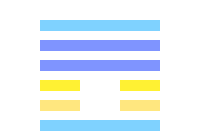
25.3.4.5 (25 > 22) - THE WÛ WANG HEXAGRAM.
- 3. The third line, divided, shows calamity happening to one who is free from insincerity ; as in the case of an ox that has been tied up. A passer by finds it (and carries it off), while the people in the neighbourhood have the calamity (of being accused and apprehended).
- 4. The fourth line, undivided, shows (a case) in which, if its subject can remain firm and correct, there will be no error.
- 5. The fifth line, undivided, shows one who is free from insincerity, and yet has fallen ill. Let him not use medicine, and he will have occasion for joy (in his recovery).
25.3.4.5 (25 > 22) - Losing immunity
One suffers the consequences of one's lack of precautions.
Bing DeepL Google Yandex25.3.4.5 (25 > 22) - Losing immunity
One suffers the consequences of one's lack of precautions.
Bing DeepL Google Yandex25.3.4.5 (25 > 22) - Wu wâng, l’innocence, l’imprévu
Wu wāng : sans blâme, irréprochable, honnête.
- 3. Celui dont la conduite est parfaite peut cependant avoir quelque malheur immérité ; c’est comme un boeuf (innocent) attaché ; son conducteur le traîne ; les gens de l’endroit le maltraitent.
-
4. La bonne conduite (seule) peut prospérer sans revers.
Elle aura une prospérité sûre. -
5. L’honnête homme malade n’a pas besoin de médecine pour être content. (Il l’est par le témoignage de sa conscience.)
Il ne doit pas en essayer.
25.3.4.5 (25 > 22) - Perdre son immunité
On subit les conséquences de son manque de précautions.
Bing DeepL Google Yandex25.3.4.5 (25 > 22) - Vakmerőség
- 3. Egy másik elvette amiben örömét lelte mert elfeledkezett róla.
- 4. Követeli ami elveszett.
- 5. Önként vállalt korlátok révén csökkent.
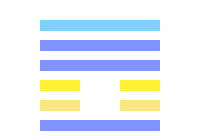
25.1.3.4.5 (25 > 52) - THE WÛ WANG HEXAGRAM.
- 1. The first line, undivided, shows its subject free from all insincerity. His advance will be accompanied with good fortune.
- 3. The third line, divided, shows calamity happening to one who is free from insincerity ; as in the case of an ox that has been tied up. A passer by finds it (and carries it off), while the people in the neighbourhood have the calamity (of being accused and apprehended).
- 4. The fourth line, undivided, shows (a case) in which, if its subject can remain firm and correct, there will be no error.
- 5. The fifth line, undivided, shows one who is free from insincerity, and yet has fallen ill. Let him not use medicine, and he will have occasion for joy (in his recovery).
25.1.3.4.5 (25 > 52) - Achieving incomparable achievements
The stars shine above those who have performed extraordinary feats.
Bing DeepL Google Yandex25.1.3.4.5 (25 > 52) - Achieving incomparable achievements
The stars shine above those who have performed extraordinary feats.
Bing DeepL Google Yandex25.1.3.4.5 (25 > 52) - Wu wâng, l’innocence, l’imprévu
Wu wāng : sans blâme, irréprochable, honnête.
- 1. Quand la conduite est irréprochable, toute démarche est heureuse.
- 3. Celui dont la conduite est parfaite peut cependant avoir quelque malheur immérité ; c’est comme un boeuf (innocent) attaché ; son conducteur le traîne ; les gens de l’endroit le maltraitent.
-
4. La bonne conduite (seule) peut prospérer sans revers.
Elle aura une prospérité sûre. -
5. L’honnête homme malade n’a pas besoin de médecine pour être content. (Il l’est par le témoignage de sa conscience.)
Il ne doit pas en essayer.
25.1.3.4.5 (25 > 52) - Réaliser des exploits incomparables
Les étoiles scintillent au-dessus de ceux qui ont fait des prouesses extraordinaires.
Bing DeepL Google Yandex25.1.3.4.5 (25 > 52) - Vakmerőség
- 1. Bizonyítékot akar látni mielőtt egyetértene.
- 3. Egy másik elvette amiben örömét lelte mert elfeledkezett róla.
- 4. Követeli ami elveszett.
- 5. Önként vállalt korlátok révén csökkent.
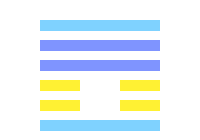
25.2.3.4.5 (25 > 26) - THE WÛ WANG HEXAGRAM.
- 2. The second line, divided, shows one who reaps without having ploughed (that he might reap), and gathers the produce of his third year's fields without having cultivated them the first year for that end. To such a one there will be advantage in whatever direction he may move.
- 3. The third line, divided, shows calamity happening to one who is free from insincerity ; as in the case of an ox that has been tied up. A passer by finds it (and carries it off), while the people in the neighbourhood have the calamity (of being accused and apprehended).
- 4. The fourth line, undivided, shows (a case) in which, if its subject can remain firm and correct, there will be no error.
- 5. The fifth line, undivided, shows one who is free from insincerity, and yet has fallen ill. Let him not use medicine, and he will have occasion for joy (in his recovery).
25.2.3.4.5 (25 > 26) - Taking possession of the premises
One occupies the land so that others cannot settle in.
Bing DeepL Google Yandex25.2.3.4.5 (25 > 26) - Taking possession of the premises
One occupies the land so that others cannot settle in.
Bing DeepL Google Yandex25.2.3.4.5 (25 > 26) - Wu wâng, l’innocence, l’imprévu
Wu wāng : sans blâme, irréprochable, honnête.
- 2. On récolte sans labourer, on moissonne sans avoir semé ; tout réussit en tout ce qu’on fait (quand on est intègre).
- 3. Celui dont la conduite est parfaite peut cependant avoir quelque malheur immérité ; c’est comme un boeuf (innocent) attaché ; son conducteur le traîne ; les gens de l’endroit le maltraitent.
-
4. La bonne conduite (seule) peut prospérer sans revers.
Elle aura une prospérité sûre. -
5. L’honnête homme malade n’a pas besoin de médecine pour être content. (Il l’est par le témoignage de sa conscience.)
Il ne doit pas en essayer.
25.2.3.4.5 (25 > 26) - Prendre possession des lieux
On occupe le terrain pour que les autres ne puissent pas s'installer.
Bing DeepL Google Yandex25.2.3.4.5 (25 > 26) - Vakmerőség
- 2. Mielőtt a nyereségre gondolnánk, javítani kell a munkánk minőségén.
- 3. Egy másik elvette amiben örömét lelte mert elfeledkezett róla.
- 4. Követeli ami elveszett.
- 5. Önként vállalt korlátok révén csökkent.
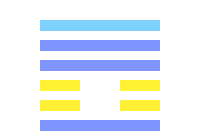
25.1.2.3.4.5 (25 > 18) - THE WÛ WANG HEXAGRAM.
- 1. The first line, undivided, shows its subject free from all insincerity. His advance will be accompanied with good fortune.
- 2. The second line, divided, shows one who reaps without having ploughed (that he might reap), and gathers the produce of his third year's fields without having cultivated them the first year for that end. To such a one there will be advantage in whatever direction he may move.
- 3. The third line, divided, shows calamity happening to one who is free from insincerity ; as in the case of an ox that has been tied up. A passer by finds it (and carries it off), while the people in the neighbourhood have the calamity (of being accused and apprehended).
- 4. The fourth line, undivided, shows (a case) in which, if its subject can remain firm and correct, there will be no error.
- 5. The fifth line, undivided, shows one who is free from insincerity, and yet has fallen ill. Let him not use medicine, and he will have occasion for joy (in his recovery).
25.1.2.3.4.5 (25 > 18) - Moving the issue forward
One is working with one's advisers to encourage them to do everything possible to resolve the problem.
Bing DeepL Google Yandex25.1.2.3.4.5 (25 > 18) - Moving the issue forward
One is working with one's advisors to encourage them to do everything possible to resolve the problem.
Bing DeepL Google Yandex25.1.2.3.4.5 (25 > 18) - Wu wâng, l’innocence, l’imprévu
Wu wāng : sans blâme, irréprochable, honnête.
- 1. Quand la conduite est irréprochable, toute démarche est heureuse.
- 2. On récolte sans labourer, on moissonne sans avoir semé ; tout réussit en tout ce qu’on fait (quand on est intègre).
- 3. Celui dont la conduite est parfaite peut cependant avoir quelque malheur immérité ; c’est comme un boeuf (innocent) attaché ; son conducteur le traîne ; les gens de l’endroit le maltraitent.
-
4. La bonne conduite (seule) peut prospérer sans revers.
Elle aura une prospérité sûre. -
5. L’honnête homme malade n’a pas besoin de médecine pour être content. (Il l’est par le témoignage de sa conscience.)
Il ne doit pas en essayer.
25.1.2.3.4.5 (25 > 18) - Faire avancer le dossier
On s'affaire auprès de ses conseillers pour les encourager à faire tout leur possible pour que le problème soit résolu.
Bing DeepL Google Yandex25.1.2.3.4.5 (25 > 18) - Vakmerőség
- 1. Bizonyítékot akar látni mielőtt egyetértene.
- 2. Mielőtt a nyereségre gondolnánk, javítani kell a munkánk minőségén.
- 3. Egy másik elvette amiben örömét lelte mert elfeledkezett róla.
- 4. Követeli ami elveszett.
- 5. Önként vállalt korlátok révén csökkent.
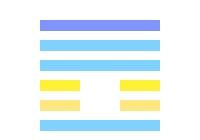
25.3.6 (25 > 49) - THE WÛ WANG HEXAGRAM.
- 3. The third line, divided, shows calamity happening to one who is free from insincerity ; as in the case of an ox that has been tied up. A passer by finds it (and carries it off), while the people in the neighbourhood have the calamity (of being accused and apprehended).
- 6. The topmost line, undivided, shows its subject free from insincerity, yet sure to fall into error, if he take action. (His action) will not be advantageous in any way.
25.3.6 (25 > 49) - Reducing the gap
Others think that one is able to return in time.
Bing DeepL Google Yandex25.3.6 (25 > 49) - Reducing the gap
Others think that one is able to return in time.
Bing DeepL Google Yandex25.3.6 (25 > 49) - Wu wâng, l’innocence, l’imprévu
Wu wāng : sans blâme, irréprochable, honnête.
- 3. Celui dont la conduite est parfaite peut cependant avoir quelque malheur immérité ; c’est comme un boeuf (innocent) attaché ; son conducteur le traîne ; les gens de l’endroit le maltraitent.
-
6. Si les actes de l’honnête homme entraînaient des malheurs, il n’y aurait plus d’avantage à rien.
Ses actes entraînent parfois le mal de l’épuisement.
25.3.6 (25 > 49) - Réduire l'écart
Les autres pensent que l'on est capable de revenir à temps.
Bing DeepL Google Yandex25.3.6 (25 > 49) - Vakmerőség
- 3. Egy másik elvette amiben örömét lelte mert elfeledkezett róla.
- 6. Nem tesz erőfeszítéseket.
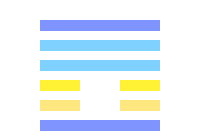
25.1.3.6 (25 > 31) - THE WÛ WANG HEXAGRAM.
- 1. The first line, undivided, shows its subject free from all insincerity. His advance will be accompanied with good fortune.
- 3. The third line, divided, shows calamity happening to one who is free from insincerity ; as in the case of an ox that has been tied up. A passer by finds it (and carries it off), while the people in the neighbourhood have the calamity (of being accused and apprehended).
- 6. The topmost line, undivided, shows its subject free from insincerity, yet sure to fall into error, if he take action. (His action) will not be advantageous in any way.
25.1.3.6 (25 > 31) - Preventing a disaster
One reacts brilliantly to prevent others from making irreparable mistakes.
Bing DeepL Google Yandex25.1.3.6 (25 > 31) - Preventing a disaster
One reacts brilliantly to prevent others from making irreparable mistakes.
Bing DeepL Google Yandex25.1.3.6 (25 > 31) - Wu wâng, l’innocence, l’imprévu
Wu wāng : sans blâme, irréprochable, honnête.
- 1. Quand la conduite est irréprochable, toute démarche est heureuse.
- 3. Celui dont la conduite est parfaite peut cependant avoir quelque malheur immérité ; c’est comme un boeuf (innocent) attaché ; son conducteur le traîne ; les gens de l’endroit le maltraitent.
-
6. Si les actes de l’honnête homme entraînaient des malheurs, il n’y aurait plus d’avantage à rien.
Ses actes entraînent parfois le mal de l’épuisement.
25.1.3.6 (25 > 31) - Empêcher une catastrophe
On réagit avec brio pour empêcher les autres de commettre des erreurs irréparables.
Bing DeepL Google Yandex25.1.3.6 (25 > 31) - Vakmerőség
- 1. Bizonyítékot akar látni mielőtt egyetértene.
- 3. Egy másik elvette amiben örömét lelte mert elfeledkezett róla.
- 6. Nem tesz erőfeszítéseket.
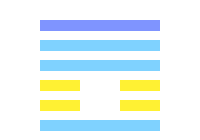
25.2.3.6 (25 > 43) - THE WÛ WANG HEXAGRAM.
- 2. The second line, divided, shows one who reaps without having ploughed (that he might reap), and gathers the produce of his third year's fields without having cultivated them the first year for that end. To such a one there will be advantage in whatever direction he may move.
- 3. The third line, divided, shows calamity happening to one who is free from insincerity ; as in the case of an ox that has been tied up. A passer by finds it (and carries it off), while the people in the neighbourhood have the calamity (of being accused and apprehended).
- 6. The topmost line, undivided, shows its subject free from insincerity, yet sure to fall into error, if he take action. (His action) will not be advantageous in any way.
25.2.3.6 (25 > 43) - Needing delicacy
One pulls on strings that are very fragile.
Bing DeepL Google Yandex25.2.3.6 (25 > 43) - Needing delicacy
One pulls on strings that are very fragile.
Bing DeepL Google Yandex25.2.3.6 (25 > 43) - Wu wâng, l’innocence, l’imprévu
Wu wāng : sans blâme, irréprochable, honnête.
- 2. On récolte sans labourer, on moissonne sans avoir semé ; tout réussit en tout ce qu’on fait (quand on est intègre).
- 3. Celui dont la conduite est parfaite peut cependant avoir quelque malheur immérité ; c’est comme un boeuf (innocent) attaché ; son conducteur le traîne ; les gens de l’endroit le maltraitent.
-
6. Si les actes de l’honnête homme entraînaient des malheurs, il n’y aurait plus d’avantage à rien.
Ses actes entraînent parfois le mal de l’épuisement.
25.2.3.6 (25 > 43) - Avoir besoin de délicatesse
On tire sur des cordes qui sont très fragiles.
Bing DeepL Google Yandex25.2.3.6 (25 > 43) - Vakmerőség
- 2. Mielőtt a nyereségre gondolnánk, javítani kell a munkánk minőségén.
- 3. Egy másik elvette amiben örömét lelte mert elfeledkezett róla.
- 6. Nem tesz erőfeszítéseket.
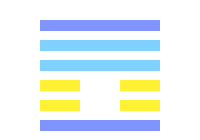
25.1.2.3.6 (25 > 28) - THE WÛ WANG HEXAGRAM.
- 1. The first line, undivided, shows its subject free from all insincerity. His advance will be accompanied with good fortune.
- 2. The second line, divided, shows one who reaps without having ploughed (that he might reap), and gathers the produce of his third year's fields without having cultivated them the first year for that end. To such a one there will be advantage in whatever direction he may move.
- 3. The third line, divided, shows calamity happening to one who is free from insincerity ; as in the case of an ox that has been tied up. A passer by finds it (and carries it off), while the people in the neighbourhood have the calamity (of being accused and apprehended).
- 6. The topmost line, undivided, shows its subject free from insincerity, yet sure to fall into error, if he take action. (His action) will not be advantageous in any way.
25.1.2.3.6 (25 > 28) - Rejecting a temporary love
One rekindles an old flame before the new one goes out.
Bing DeepL Google Yandex25.1.2.3.6 (25 > 28) - Rejecting a temporary love
One rekindles an old flame before the new one goes out.
Bing DeepL Google Yandex25.1.2.3.6 (25 > 28) - Wu wâng, l’innocence, l’imprévu
Wu wāng : sans blâme, irréprochable, honnête.
- 1. Quand la conduite est irréprochable, toute démarche est heureuse.
- 2. On récolte sans labourer, on moissonne sans avoir semé ; tout réussit en tout ce qu’on fait (quand on est intègre).
- 3. Celui dont la conduite est parfaite peut cependant avoir quelque malheur immérité ; c’est comme un boeuf (innocent) attaché ; son conducteur le traîne ; les gens de l’endroit le maltraitent.
-
6. Si les actes de l’honnête homme entraînaient des malheurs, il n’y aurait plus d’avantage à rien.
Ses actes entraînent parfois le mal de l’épuisement.
25.1.2.3.6 (25 > 28) - Répudier un amour passager
On rallume une ancienne flamme avant que la nouvelle ne s'éteigne.
Bing DeepL Google Yandex25.1.2.3.6 (25 > 28) - Vakmerőség
- 1. Bizonyítékot akar látni mielőtt egyetértene.
- 2. Mielőtt a nyereségre gondolnánk, javítani kell a munkánk minőségén.
- 3. Egy másik elvette amiben örömét lelte mert elfeledkezett róla.
- 6. Nem tesz erőfeszítéseket.
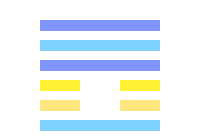
25.3.4.6 (25 > 63) - THE WÛ WANG HEXAGRAM.
- 3. The third line, divided, shows calamity happening to one who is free from insincerity ; as in the case of an ox that has been tied up. A passer by finds it (and carries it off), while the people in the neighbourhood have the calamity (of being accused and apprehended).
- 4. The fourth line, undivided, shows (a case) in which, if its subject can remain firm and correct, there will be no error.
- 6. The topmost line, undivided, shows its subject free from insincerity, yet sure to fall into error, if he take action. (His action) will not be advantageous in any way.
25.3.4.6 (25 > 63) - Holding the position
One assigns troops to a location that one considers strategic.
Bing DeepL Google Yandex25.3.4.6 (25 > 63) - Holding the position
One assigns troops to a location that one considers strategic.
Bing DeepL Google Yandex25.3.4.6 (25 > 63) - Wu wâng, l’innocence, l’imprévu
Wu wāng : sans blâme, irréprochable, honnête.
- 3. Celui dont la conduite est parfaite peut cependant avoir quelque malheur immérité ; c’est comme un boeuf (innocent) attaché ; son conducteur le traîne ; les gens de l’endroit le maltraitent.
-
4. La bonne conduite (seule) peut prospérer sans revers.
Elle aura une prospérité sûre. -
6. Si les actes de l’honnête homme entraînaient des malheurs, il n’y aurait plus d’avantage à rien.
Ses actes entraînent parfois le mal de l’épuisement.
25.3.4.6 (25 > 63) - Tenir la position
On affecte des troupes à un emplacement que l'on considère comme étant stratégique.
Bing DeepL Google Yandex25.3.4.6 (25 > 63) - Vakmerőség
- 3. Egy másik elvette amiben örömét lelte mert elfeledkezett róla.
- 4. Követeli ami elveszett.
- 6. Nem tesz erőfeszítéseket.
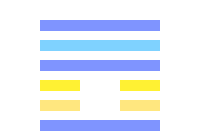
25.1.3.4.6 (25 > 39) - THE WÛ WANG HEXAGRAM.
- 1. The first line, undivided, shows its subject free from all insincerity. His advance will be accompanied with good fortune.
- 3. The third line, divided, shows calamity happening to one who is free from insincerity ; as in the case of an ox that has been tied up. A passer by finds it (and carries it off), while the people in the neighbourhood have the calamity (of being accused and apprehended).
- 4. The fourth line, undivided, shows (a case) in which, if its subject can remain firm and correct, there will be no error.
- 6. The topmost line, undivided, shows its subject free from insincerity, yet sure to fall into error, if he take action. (His action) will not be advantageous in any way.
25.1.3.4.6 (25 > 39) - Investigating the scene
One makes a crucial visit to determine the real causes of the tragedy.
Bing DeepL Google Yandex25.1.3.4.6 (25 > 39) - Investigating the scene
One makes a crucial visit to determine the real causes of the tragedy.
Bing DeepL Google Yandex25.1.3.4.6 (25 > 39) - Wu wâng, l’innocence, l’imprévu
Wu wāng : sans blâme, irréprochable, honnête.
- 1. Quand la conduite est irréprochable, toute démarche est heureuse.
- 3. Celui dont la conduite est parfaite peut cependant avoir quelque malheur immérité ; c’est comme un boeuf (innocent) attaché ; son conducteur le traîne ; les gens de l’endroit le maltraitent.
-
4. La bonne conduite (seule) peut prospérer sans revers.
Elle aura une prospérité sûre. -
6. Si les actes de l’honnête homme entraînaient des malheurs, il n’y aurait plus d’avantage à rien.
Ses actes entraînent parfois le mal de l’épuisement.
25.1.3.4.6 (25 > 39) - Expertiser le lieu du drame
On effectue une visite cruciale pour déterminer les causes réelles de la tragédie.
Bing DeepL Google Yandex25.1.3.4.6 (25 > 39) - Vakmerőség
- 1. Bizonyítékot akar látni mielőtt egyetértene.
- 3. Egy másik elvette amiben örömét lelte mert elfeledkezett róla.
- 4. Követeli ami elveszett.
- 6. Nem tesz erőfeszítéseket.
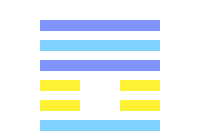
25.2.3.4.6 (25 > 5) - THE WÛ WANG HEXAGRAM.
- 2. The second line, divided, shows one who reaps without having ploughed (that he might reap), and gathers the produce of his third year's fields without having cultivated them the first year for that end. To such a one there will be advantage in whatever direction he may move.
- 3. The third line, divided, shows calamity happening to one who is free from insincerity ; as in the case of an ox that has been tied up. A passer by finds it (and carries it off), while the people in the neighbourhood have the calamity (of being accused and apprehended).
- 4. The fourth line, undivided, shows (a case) in which, if its subject can remain firm and correct, there will be no error.
- 6. The topmost line, undivided, shows its subject free from insincerity, yet sure to fall into error, if he take action. (His action) will not be advantageous in any way.
25.2.3.4.6 (25 > 5) - Not being alarmed too quickly
One waits for news before worrying.
Bing DeepL Google Yandex25.2.3.4.6 (25 > 5) - Not being alarmed too quickly
One waits for news before worrying.
Bing DeepL Google Yandex25.2.3.4.6 (25 > 5) - Wu wâng, l’innocence, l’imprévu
Wu wāng : sans blâme, irréprochable, honnête.
- 2. On récolte sans labourer, on moissonne sans avoir semé ; tout réussit en tout ce qu’on fait (quand on est intègre).
- 3. Celui dont la conduite est parfaite peut cependant avoir quelque malheur immérité ; c’est comme un boeuf (innocent) attaché ; son conducteur le traîne ; les gens de l’endroit le maltraitent.
-
4. La bonne conduite (seule) peut prospérer sans revers.
Elle aura une prospérité sûre. -
6. Si les actes de l’honnête homme entraînaient des malheurs, il n’y aurait plus d’avantage à rien.
Ses actes entraînent parfois le mal de l’épuisement.
25.2.3.4.6 (25 > 5) - Ne pas s'alarmer trop vite
On attend des nouvelles avant de s'inquiéter.
Bing DeepL Google Yandex25.2.3.4.6 (25 > 5) - Vakmerőség
- 2. Mielőtt a nyereségre gondolnánk, javítani kell a munkánk minőségén.
- 3. Egy másik elvette amiben örömét lelte mert elfeledkezett róla.
- 4. Követeli ami elveszett.
- 6. Nem tesz erőfeszítéseket.
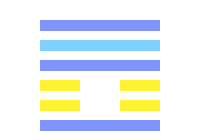
25.1.2.3.4.6 (25 > 48) - THE WÛ WANG HEXAGRAM.
- 1. The first line, undivided, shows its subject free from all insincerity. His advance will be accompanied with good fortune.
- 2. The second line, divided, shows one who reaps without having ploughed (that he might reap), and gathers the produce of his third year's fields without having cultivated them the first year for that end. To such a one there will be advantage in whatever direction he may move.
- 3. The third line, divided, shows calamity happening to one who is free from insincerity ; as in the case of an ox that has been tied up. A passer by finds it (and carries it off), while the people in the neighbourhood have the calamity (of being accused and apprehended).
- 4. The fourth line, undivided, shows (a case) in which, if its subject can remain firm and correct, there will be no error.
- 6. The topmost line, undivided, shows its subject free from insincerity, yet sure to fall into error, if he take action. (His action) will not be advantageous in any way.
25.1.2.3.4.6 (25 > 48) - Taking stock
One contemplates one's progress in the light of one's achievements.
Bing DeepL Google Yandex25.1.2.3.4.6 (25 > 48) - Taking stock
One contemplates one's progress in the light of one's achievements.
Bing DeepL Google Yandex25.1.2.3.4.6 (25 > 48) - Wu wâng, l’innocence, l’imprévu
Wu wāng : sans blâme, irréprochable, honnête.
- 1. Quand la conduite est irréprochable, toute démarche est heureuse.
- 2. On récolte sans labourer, on moissonne sans avoir semé ; tout réussit en tout ce qu’on fait (quand on est intègre).
- 3. Celui dont la conduite est parfaite peut cependant avoir quelque malheur immérité ; c’est comme un boeuf (innocent) attaché ; son conducteur le traîne ; les gens de l’endroit le maltraitent.
-
4. La bonne conduite (seule) peut prospérer sans revers.
Elle aura une prospérité sûre. -
6. Si les actes de l’honnête homme entraînaient des malheurs, il n’y aurait plus d’avantage à rien.
Ses actes entraînent parfois le mal de l’épuisement.
25.1.2.3.4.6 (25 > 48) - Faire son bilan
On contemple ses progrès à l'aune de ses réalisations.
Bing DeepL Google Yandex25.1.2.3.4.6 (25 > 48) - Vakmerőség
- 1. Bizonyítékot akar látni mielőtt egyetértene.
- 2. Mielőtt a nyereségre gondolnánk, javítani kell a munkánk minőségén.
- 3. Egy másik elvette amiben örömét lelte mert elfeledkezett róla.
- 4. Követeli ami elveszett.
- 6. Nem tesz erőfeszítéseket.
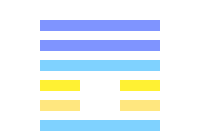
25.3.5.6 (25 > 55) - THE WÛ WANG HEXAGRAM.
- 3. The third line, divided, shows calamity happening to one who is free from insincerity ; as in the case of an ox that has been tied up. A passer by finds it (and carries it off), while the people in the neighbourhood have the calamity (of being accused and apprehended).
- 5. The fifth line, undivided, shows one who is free from insincerity, and yet has fallen ill. Let him not use medicine, and he will have occasion for joy (in his recovery).
- 6. The topmost line, undivided, shows its subject free from insincerity, yet sure to fall into error, if he take action. (His action) will not be advantageous in any way.
25.3.5.6 (25 > 55) - Insuring oneself against risks
One will face serious obstacles if we forget to take all the necessary precautions.
Bing DeepL Google Yandex25.3.5.6 (25 > 55) - Insuring oneself against risks
One will face serious obstacles if we forget to take all the necessary precautions.
Bing DeepL Google Yandex25.3.5.6 (25 > 55) - Wu wâng, l’innocence, l’imprévu
Wu wāng : sans blâme, irréprochable, honnête.
- 3. Celui dont la conduite est parfaite peut cependant avoir quelque malheur immérité ; c’est comme un boeuf (innocent) attaché ; son conducteur le traîne ; les gens de l’endroit le maltraitent.
-
5. L’honnête homme malade n’a pas besoin de médecine pour être content. (Il l’est par le témoignage de sa conscience.)
Il ne doit pas en essayer. -
6. Si les actes de l’honnête homme entraînaient des malheurs, il n’y aurait plus d’avantage à rien.
Ses actes entraînent parfois le mal de l’épuisement.
25.3.5.6 (25 > 55) - S'assurer contre les risques
On ira au devant de graves empêchements si l'on oublie de prendre toutes les précautions nécessaires.
Bing DeepL Google Yandex25.3.5.6 (25 > 55) - Vakmerőség
- 3. Egy másik elvette amiben örömét lelte mert elfeledkezett róla.
- 5. Önként vállalt korlátok révén csökkent.
- 6. Nem tesz erőfeszítéseket.
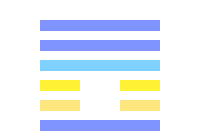
25.1.3.5.6 (25 > 62) - THE WÛ WANG HEXAGRAM.
- 1. The first line, undivided, shows its subject free from all insincerity. His advance will be accompanied with good fortune.
- 3. The third line, divided, shows calamity happening to one who is free from insincerity ; as in the case of an ox that has been tied up. A passer by finds it (and carries it off), while the people in the neighbourhood have the calamity (of being accused and apprehended).
- 5. The fifth line, undivided, shows one who is free from insincerity, and yet has fallen ill. Let him not use medicine, and he will have occasion for joy (in his recovery).
- 6. The topmost line, undivided, shows its subject free from insincerity, yet sure to fall into error, if he take action. (His action) will not be advantageous in any way.
25.1.3.5.6 (25 > 62) - Letting them rest
One is always on the others' backs when one should let them breathe a few times.
Bing DeepL Google Yandex25.1.3.5.6 (25 > 62) - Letting them rest
One is always on the others' backs when one should let them breathe a few times.
Bing DeepL Google Yandex25.1.3.5.6 (25 > 62) - Wu wâng, l’innocence, l’imprévu
Wu wāng : sans blâme, irréprochable, honnête.
- 1. Quand la conduite est irréprochable, toute démarche est heureuse.
- 3. Celui dont la conduite est parfaite peut cependant avoir quelque malheur immérité ; c’est comme un boeuf (innocent) attaché ; son conducteur le traîne ; les gens de l’endroit le maltraitent.
-
5. L’honnête homme malade n’a pas besoin de médecine pour être content. (Il l’est par le témoignage de sa conscience.)
Il ne doit pas en essayer. -
6. Si les actes de l’honnête homme entraînaient des malheurs, il n’y aurait plus d’avantage à rien.
Ses actes entraînent parfois le mal de l’épuisement.
25.1.3.5.6 (25 > 62) - Laisser reposer
On est tout le temps sur le dos des autres alors qu'on devrait les laisser respirer quelques fois.
Bing DeepL Google Yandex25.1.3.5.6 (25 > 62) - Vakmerőség
- 1. Bizonyítékot akar látni mielőtt egyetértene.
- 3. Egy másik elvette amiben örömét lelte mert elfeledkezett róla.
- 5. Önként vállalt korlátok révén csökkent.
- 6. Nem tesz erőfeszítéseket.
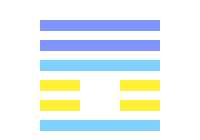
25.2.3.5.6 (25 > 34) - THE WÛ WANG HEXAGRAM.
- 2. The second line, divided, shows one who reaps without having ploughed (that he might reap), and gathers the produce of his third year's fields without having cultivated them the first year for that end. To such a one there will be advantage in whatever direction he may move.
- 3. The third line, divided, shows calamity happening to one who is free from insincerity ; as in the case of an ox that has been tied up. A passer by finds it (and carries it off), while the people in the neighbourhood have the calamity (of being accused and apprehended).
- 5. The fifth line, undivided, shows one who is free from insincerity, and yet has fallen ill. Let him not use medicine, and he will have occasion for joy (in his recovery).
- 6. The topmost line, undivided, shows its subject free from insincerity, yet sure to fall into error, if he take action. (His action) will not be advantageous in any way.
25.2.3.5.6 (25 > 34) - Having a difficult character
One deprives one's forebears of the hope of having educated their children properly.
Bing DeepL Google Yandex25.2.3.5.6 (25 > 34) - Having a difficult character
One deprives one's forebears of the hope of having educated their children properly.
Bing DeepL Google Yandex25.2.3.5.6 (25 > 34) - Wu wâng, l’innocence, l’imprévu
Wu wāng : sans blâme, irréprochable, honnête.
- 2. On récolte sans labourer, on moissonne sans avoir semé ; tout réussit en tout ce qu’on fait (quand on est intègre).
- 3. Celui dont la conduite est parfaite peut cependant avoir quelque malheur immérité ; c’est comme un boeuf (innocent) attaché ; son conducteur le traîne ; les gens de l’endroit le maltraitent.
-
5. L’honnête homme malade n’a pas besoin de médecine pour être content. (Il l’est par le témoignage de sa conscience.)
Il ne doit pas en essayer. -
6. Si les actes de l’honnête homme entraînaient des malheurs, il n’y aurait plus d’avantage à rien.
Ses actes entraînent parfois le mal de l’épuisement.
25.2.3.5.6 (25 > 34) - Avoir un caractère difficile
On prive ses aïeux de l'espoir d'avoir éduqué ses enfants correctement.
Bing DeepL Google Yandex25.2.3.5.6 (25 > 34) - Vakmerőség
- 2. Mielőtt a nyereségre gondolnánk, javítani kell a munkánk minőségén.
- 3. Egy másik elvette amiben örömét lelte mert elfeledkezett róla.
- 5. Önként vállalt korlátok révén csökkent.
- 6. Nem tesz erőfeszítéseket.
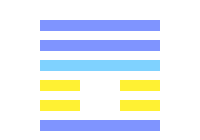
25.1.2.3.5.6 (25 > 32) - THE WÛ WANG HEXAGRAM.
- 1. The first line, undivided, shows its subject free from all insincerity. His advance will be accompanied with good fortune.
- 2. The second line, divided, shows one who reaps without having ploughed (that he might reap), and gathers the produce of his third year's fields without having cultivated them the first year for that end. To such a one there will be advantage in whatever direction he may move.
- 3. The third line, divided, shows calamity happening to one who is free from insincerity ; as in the case of an ox that has been tied up. A passer by finds it (and carries it off), while the people in the neighbourhood have the calamity (of being accused and apprehended).
- 5. The fifth line, undivided, shows one who is free from insincerity, and yet has fallen ill. Let him not use medicine, and he will have occasion for joy (in his recovery).
- 6. The topmost line, undivided, shows its subject free from insincerity, yet sure to fall into error, if he take action. (His action) will not be advantageous in any way.
25.1.2.3.5.6 (25 > 32) - Living in a closed circuit
One pays more attention to one's properties than to those of others.
Bing DeepL Google Yandex25.1.2.3.5.6 (25 > 32) - Living in a closed circuit
One pays more attention to one's properties than to those of others.
Bing DeepL Google Yandex25.1.2.3.5.6 (25 > 32) - Wu wâng, l’innocence, l’imprévu
Wu wāng : sans blâme, irréprochable, honnête.
- 1. Quand la conduite est irréprochable, toute démarche est heureuse.
- 2. On récolte sans labourer, on moissonne sans avoir semé ; tout réussit en tout ce qu’on fait (quand on est intègre).
- 3. Celui dont la conduite est parfaite peut cependant avoir quelque malheur immérité ; c’est comme un boeuf (innocent) attaché ; son conducteur le traîne ; les gens de l’endroit le maltraitent.
-
5. L’honnête homme malade n’a pas besoin de médecine pour être content. (Il l’est par le témoignage de sa conscience.)
Il ne doit pas en essayer. -
6. Si les actes de l’honnête homme entraînaient des malheurs, il n’y aurait plus d’avantage à rien.
Ses actes entraînent parfois le mal de l’épuisement.
25.1.2.3.5.6 (25 > 32) - Vivre en circuit fermé
On fait plus attention à ses propriétés qu'à celles des autres.
Bing DeepL Google Yandex25.1.2.3.5.6 (25 > 32) - Vakmerőség
- 1. Bizonyítékot akar látni mielőtt egyetértene.
- 2. Mielőtt a nyereségre gondolnánk, javítani kell a munkánk minőségén.
- 3. Egy másik elvette amiben örömét lelte mert elfeledkezett róla.
- 5. Önként vállalt korlátok révén csökkent.
- 6. Nem tesz erőfeszítéseket.
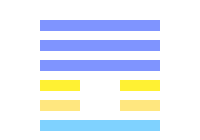
25.3.4.5.6 (25 > 36) - THE WÛ WANG HEXAGRAM.
- 3. The third line, divided, shows calamity happening to one who is free from insincerity ; as in the case of an ox that has been tied up. A passer by finds it (and carries it off), while the people in the neighbourhood have the calamity (of being accused and apprehended).
- 4. The fourth line, undivided, shows (a case) in which, if its subject can remain firm and correct, there will be no error.
- 5. The fifth line, undivided, shows one who is free from insincerity, and yet has fallen ill. Let him not use medicine, and he will have occasion for joy (in his recovery).
- 6. The topmost line, undivided, shows its subject free from insincerity, yet sure to fall into error, if he take action. (His action) will not be advantageous in any way.
25.3.4.5.6 (25 > 36) - Indulging in magic
One dreams of being able to do extraordinary things.
Bing DeepL Google Yandex25.3.4.5.6 (25 > 36) - Indulging in magic
One dreams of being able to do extraordinary things.
Bing DeepL Google Yandex25.3.4.5.6 (25 > 36) - Wu wâng, l’innocence, l’imprévu
Wu wāng : sans blâme, irréprochable, honnête.
- 3. Celui dont la conduite est parfaite peut cependant avoir quelque malheur immérité ; c’est comme un boeuf (innocent) attaché ; son conducteur le traîne ; les gens de l’endroit le maltraitent.
-
4. La bonne conduite (seule) peut prospérer sans revers.
Elle aura une prospérité sûre. -
5. L’honnête homme malade n’a pas besoin de médecine pour être content. (Il l’est par le témoignage de sa conscience.)
Il ne doit pas en essayer. -
6. Si les actes de l’honnête homme entraînaient des malheurs, il n’y aurait plus d’avantage à rien.
Ses actes entraînent parfois le mal de l’épuisement.
25.3.4.5.6 (25 > 36) - S'adonner à la magie
On rêve de pouvoir faire des choses extraordinaires.
Bing DeepL Google Yandex25.3.4.5.6 (25 > 36) - Vakmerőség
- 3. Egy másik elvette amiben örömét lelte mert elfeledkezett róla.
- 4. Követeli ami elveszett.
- 5. Önként vállalt korlátok révén csökkent.
- 6. Nem tesz erőfeszítéseket.
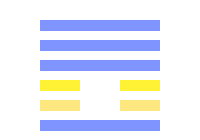
25.1.3.4.5.6 (25 > 15) - THE WÛ WANG HEXAGRAM.
- 1. The first line, undivided, shows its subject free from all insincerity. His advance will be accompanied with good fortune.
- 3. The third line, divided, shows calamity happening to one who is free from insincerity ; as in the case of an ox that has been tied up. A passer by finds it (and carries it off), while the people in the neighbourhood have the calamity (of being accused and apprehended).
- 4. The fourth line, undivided, shows (a case) in which, if its subject can remain firm and correct, there will be no error.
- 5. The fifth line, undivided, shows one who is free from insincerity, and yet has fallen ill. Let him not use medicine, and he will have occasion for joy (in his recovery).
- 6. The topmost line, undivided, shows its subject free from insincerity, yet sure to fall into error, if he take action. (His action) will not be advantageous in any way.
25.1.3.4.5.6 (25 > 15) - Regretting the inefficiency
One feels the inconvenience caused by the lack of results.
Bing DeepL Google Yandex25.1.3.4.5.6 (25 > 15) - Regretting the inefficiency
One feels the inconvenience caused by the lack of results.
Bing DeepL Google Yandex25.1.3.4.5.6 (25 > 15) - Wu wâng, l’innocence, l’imprévu
Wu wāng : sans blâme, irréprochable, honnête.
- 1. Quand la conduite est irréprochable, toute démarche est heureuse.
- 3. Celui dont la conduite est parfaite peut cependant avoir quelque malheur immérité ; c’est comme un boeuf (innocent) attaché ; son conducteur le traîne ; les gens de l’endroit le maltraitent.
-
4. La bonne conduite (seule) peut prospérer sans revers.
Elle aura une prospérité sûre. -
5. L’honnête homme malade n’a pas besoin de médecine pour être content. (Il l’est par le témoignage de sa conscience.)
Il ne doit pas en essayer. -
6. Si les actes de l’honnête homme entraînaient des malheurs, il n’y aurait plus d’avantage à rien.
Ses actes entraînent parfois le mal de l’épuisement.
25.1.3.4.5.6 (25 > 15) - Regretter l'inefficacité
On ressent la gêne causée par l'absence de résultats.
Bing DeepL Google Yandex25.1.3.4.5.6 (25 > 15) - Vakmerőség
- 1. Bizonyítékot akar látni mielőtt egyetértene.
- 3. Egy másik elvette amiben örömét lelte mert elfeledkezett róla.
- 4. Követeli ami elveszett.
- 5. Önként vállalt korlátok révén csökkent.
- 6. Nem tesz erőfeszítéseket.
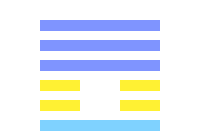
25.2.3.4.5.6 (25 > 11) - THE WÛ WANG HEXAGRAM.
- 2. The second line, divided, shows one who reaps without having ploughed (that he might reap), and gathers the produce of his third year's fields without having cultivated them the first year for that end. To such a one there will be advantage in whatever direction he may move.
- 3. The third line, divided, shows calamity happening to one who is free from insincerity ; as in the case of an ox that has been tied up. A passer by finds it (and carries it off), while the people in the neighbourhood have the calamity (of being accused and apprehended).
- 4. The fourth line, undivided, shows (a case) in which, if its subject can remain firm and correct, there will be no error.
- 5. The fifth line, undivided, shows one who is free from insincerity, and yet has fallen ill. Let him not use medicine, and he will have occasion for joy (in his recovery).
- 6. The topmost line, undivided, shows its subject free from insincerity, yet sure to fall into error, if he take action. (His action) will not be advantageous in any way.
25.2.3.4.5.6 (25 > 11) - Seeking a common basis
The main matters of difference are discarded to agree on the essential.
Bing DeepL Google Yandex25.2.3.4.5.6 (25 > 11) - Seeking a common basis
The main matters of difference are discarded to agree on the essential.
Bing DeepL Google Yandex25.2.3.4.5.6 (25 > 11) - Wu wâng, l’innocence, l’imprévu
Wu wāng : sans blâme, irréprochable, honnête.
- 2. On récolte sans labourer, on moissonne sans avoir semé ; tout réussit en tout ce qu’on fait (quand on est intègre).
- 3. Celui dont la conduite est parfaite peut cependant avoir quelque malheur immérité ; c’est comme un boeuf (innocent) attaché ; son conducteur le traîne ; les gens de l’endroit le maltraitent.
-
4. La bonne conduite (seule) peut prospérer sans revers.
Elle aura une prospérité sûre. -
5. L’honnête homme malade n’a pas besoin de médecine pour être content. (Il l’est par le témoignage de sa conscience.)
Il ne doit pas en essayer. -
6. Si les actes de l’honnête homme entraînaient des malheurs, il n’y aurait plus d’avantage à rien.
Ses actes entraînent parfois le mal de l’épuisement.
25.2.3.4.5.6 (25 > 11) - Chercher une base commune
On écarte les principaux sujets de différence pour s'accorder sur l'essentiel.
Bing DeepL Google Yandex25.2.3.4.5.6 (25 > 11) - Vakmerőség
- 2. Mielőtt a nyereségre gondolnánk, javítani kell a munkánk minőségén.
- 3. Egy másik elvette amiben örömét lelte mert elfeledkezett róla.
- 4. Követeli ami elveszett.
- 5. Önként vállalt korlátok révén csökkent.
- 6. Nem tesz erőfeszítéseket.
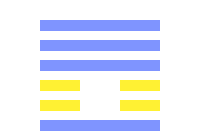
25.1.2.3.4.5.6 (25 > 46) - THE WÛ WANG HEXAGRAM.
- 1. The first line, undivided, shows its subject free from all insincerity. His advance will be accompanied with good fortune.
- 2. The second line, divided, shows one who reaps without having ploughed (that he might reap), and gathers the produce of his third year's fields without having cultivated them the first year for that end. To such a one there will be advantage in whatever direction he may move.
- 3. The third line, divided, shows calamity happening to one who is free from insincerity ; as in the case of an ox that has been tied up. A passer by finds it (and carries it off), while the people in the neighbourhood have the calamity (of being accused and apprehended).
- 4. The fourth line, undivided, shows (a case) in which, if its subject can remain firm and correct, there will be no error.
- 5. The fifth line, undivided, shows one who is free from insincerity, and yet has fallen ill. Let him not use medicine, and he will have occasion for joy (in his recovery).
- 6. The topmost line, undivided, shows its subject free from insincerity, yet sure to fall into error, if he take action. (His action) will not be advantageous in any way.
25.1.2.3.4.5.6 (25 > 46) - Distorting the facts
One hides part of the truth so that one's point of view is not challenged.
Bing DeepL Google Yandex25.1.2.3.4.5.6 (25 > 46) - Distorting the facts
One hides part of the truth so that one's point of view is not challenged.
Bing DeepL Google Yandex25.1.2.3.4.5.6 (25 > 46) - Wu wâng, l’innocence, l’imprévu
Wu wāng : sans blâme, irréprochable, honnête.
- 1. Quand la conduite est irréprochable, toute démarche est heureuse.
- 2. On récolte sans labourer, on moissonne sans avoir semé ; tout réussit en tout ce qu’on fait (quand on est intègre).
- 3. Celui dont la conduite est parfaite peut cependant avoir quelque malheur immérité ; c’est comme un boeuf (innocent) attaché ; son conducteur le traîne ; les gens de l’endroit le maltraitent.
-
4. La bonne conduite (seule) peut prospérer sans revers.
Elle aura une prospérité sûre. -
5. L’honnête homme malade n’a pas besoin de médecine pour être content. (Il l’est par le témoignage de sa conscience.)
Il ne doit pas en essayer. -
6. Si les actes de l’honnête homme entraînaient des malheurs, il n’y aurait plus d’avantage à rien.
Ses actes entraînent parfois le mal de l’épuisement.
25.1.2.3.4.5.6 (25 > 46) - Altérer les faits
On occulte une partie de la vérité pour que son point de vue ne soit pas remis en cause.
Bing DeepL Google Yandex25.1.2.3.4.5.6 (25 > 46) - Vakmerőség
- 1. Bizonyítékot akar látni mielőtt egyetértene.
- 2. Mielőtt a nyereségre gondolnánk, javítani kell a munkánk minőségén.
- 3. Egy másik elvette amiben örömét lelte mert elfeledkezett róla.
- 4. Követeli ami elveszett.
- 5. Önként vállalt korlátok révén csökkent.
- 6. Nem tesz erőfeszítéseket.

